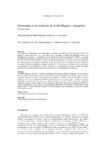Mostrar o rexistro simple do ítem
Fisioterapia en el syndrome de Smith-Magenis: a propósito de un caso
| dc.contributor.author | González Leiro, M. | |
| dc.contributor.author | Chouza-Insua, Marcelo | |
| dc.contributor.author | Senín-Camargo, Francisco | |
| dc.contributor.author | Viñas-Diz, Susana | |
| dc.date.accessioned | 2016-02-29T11:57:05Z | |
| dc.date.available | 2016-02-29T11:57:05Z | |
| dc.date.issued | 2013-04 | |
| dc.identifier.citation | González Leiro M, Chouza-Insua M, Senín-Camargo FJ, Viñas Diz S. Fisioterapia en el syndrome de Smith-Magenis: a propósito de un caso. Fisioterapia. 2013;35(4):180-183 | es_ES |
| dc.identifier.uri | http://hdl.handle.net/2183/16136 | |
| dc.description.abstract | [Resumen] El síndrome de Smith-Magenis es una alteración del desarrollo psicomotor de origen genético, incluido en el grupo de enfermedades raras. En el caso clínico que se presenta, se realizó una valoración inicial de la coordinación, la marcha y el equilibrio a través del test de desarrollo psicomotor (TEPSI), un circuito diseñado específicamente, la prueba del tablero de clavijas de Purdue y el test Timed up and Go. Al finalizar los 3 meses que duró el tratamiento, basado en actividades de tipo lúdico, se realizó una valoración final con las mismas pruebas, encontrándose importantes diferencias objetivas en los resultados obtenidos, además de una mejoría subjetiva reportada por los padres del paciente. A pesar de que la evidencia sobre el tratamiento de fisioterapia en este síndrome es escasa, atendiendo a los resultados encontrados creemos que dicho tratamiento está totalmente justificado en el abordaje integral de los pacientes que lo padecen. | es_ES |
| dc.description.abstract | [Abstract] The Smith-Magenis syndrome is a genetic psychomotor development disorder included in the group of rare diseases. In the clinical case presented, we performed an initial assessment of coordination, gait and balance using four different tests. These were psychomotor development test (TEPSI scale), Purdue pegboard, time up and go test, and a circuit designed specifically for this clinical case. At the end of the 3 months of treatment, and based on recreational type activities, a final assessment was made with the same tests. Significant objectives differences in the results as well as subjective improvement reported by the patient's parents were found. Although there is little evidence on physiotherapy treatment for this syndrome, in accordance with the results found, we believe that this treatment is totally justified in the comprehensive approach to patients suffering this disorder. | es_ES |
| dc.language.iso | spa | es_ES |
| dc.publisher | Elsevier | es_ES |
| dc.relation.uri | http://dx.doi.org/10.1016/j.ft.2012.11.002 | es_ES |
| dc.rights | Creative Commons Attribution-NonCommercial-NoDerivs 4.0 International License (CC-BY-NC-ND 4.0) | es_ES |
| dc.rights.uri | http://creativecommons.org/licenses/by-nc-nd/4.0/ | |
| dc.subject | Fisioterapia | es_ES |
| dc.subject | Enfermedad rara | es_ES |
| dc.subject | Psicomotricidad | es_ES |
| dc.subject | Physiotherapy | es_ES |
| dc.subject | Rare diseases | es_ES |
| dc.subject | Psychomotricity | es_ES |
| dc.title | Fisioterapia en el syndrome de Smith-Magenis: a propósito de un caso | es_ES |
| dc.title.alternative | Physiotherapy in Smith-Magenis syndrome: a case report | es_ES |
| dc.type | info:eu-repo/semantics/article | es_ES |
| dc.rights.access | info:eu-repo/semantics/openAccess | es_ES |
Ficheiros no ítem
Este ítem aparece na(s) seguinte(s) colección(s)
-
GI-NEURO - Artigos [165]






